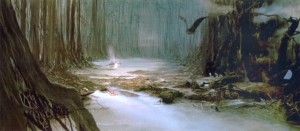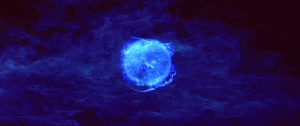San Diego Comic Con kicked off yesterday. Other than Skywalker Ranch, I can’t think of a nerdier holy site. I’ve never been to Comic Con but really hope to make it some day. Alycia thinks that I don’t want my level of nerd to reach that extreme but she couldn’t be any more wrong. I don’t think I’d dress up but I’d be more than happy to stand in line to make it into the infamous Hall H.
Check out some of these other nerdy holy sites.
Dagobah Cave
Dagobah’s unique qualities were explored more in depth in the Thrawn Trilogy. In those books Luke surmised that there must have been something special about Dagobah that shielded Yoda from Vader and the Emperor. I haven’t spent much time in the expanded universe, but the cave on Dagobah seems like one of the holiest places in the entire Star Wars universe. It’s a special place that gives its visitors visions of what could be or what might have been. For some reason the Force is strong in that Dagobah cave and any young Jedi would benefit from its warnings.
Sha Ka Ree
I really need to watch The Final Frontier again. I watched it when I was 13 and really only remember the Yosemite scene and the alien with the extra mammary gland. I know that Spock’s half brother hijacks the Enterprise in order to fly to the center of the galaxy to find Sha Ka Ree, the Vulcan equivalent of the Garden of Eden. For a universe based completely on secular thought, the idea of finding a holy place at the center of the galaxy is very intriguing. Unfortunately for us faith-based trekkies, all Kirk and crew found was a god who needed a space ship.
Kobol
Kobol was the traditional birthplace of the humans who eventually founded the 12 Colonies in Battlestar Galactica. It’s been a while since I watched Battlestar Galactica and I can’t remember much about what happened on Kobol. I know that President Roslin had a vision, which led to Commander Adama leading a military coup against the government. After that things get a little fuzzy and I can’t really remember what happened in the series. Really, all that I remember from Battlestar Galactica is the scene where the Galactica drops into New Caprica’s atmosphere and launches a bunch of Vipers and then jumps out. That may be one of the greatest television scenes ever.
Comic Con really is the Mecca for nerds. I’ve never been but hope to experience it some day. Thankfully for us, our experience with God isn’t limited to certain holy sites or temple mounts. We can experience God every day, regardless of where we find ourselves. Which is great because Israel is a long way from southern California.
What are some of your favorite nerdy holy sites?




Lothlorien certainly has the feel of the mysterium tremendum about it.
Here’s one! http://www.newstarship.com/
“For a universe based completely on secular thought, the idea of finding a holy place at the center of the galaxy is very intriguing. Unfortunately for us faith-based trekkies, all Kirk and crew found was a god who needed a space ship.”
I’m going to disagree with you a bit here. I think Star Trek is anything but “based completely on secular thought,” but that would take a good bit of explaining. Suffice it to say, however, that Star Trek is very spiritual and comes from a deeply spiritual person. It is also shot through with Biblical images and references. It does purport to be based wholly on reason and to reject religion, but one of its reasonable conclusions is the reality of the spiritual.
And, really, the influence of the Bible and Christianity on Star Trek is immeasurably large, if for no other reason than the fact that Gene Roddenberry’s worldview is ultimately grounded in the Christian background that he rejected and constructed his philosophy in response to.
And what Kirk and crew find on that planet in ‘Star Trek V’ is not unfortunate, but really quite good. They find something that tells them that God is not that which we make in our own image. They once again reveal a false god for what it is and ultimately conclude that God must reside within. In true Star Trek fashion, it is the interior journey that is most important. It’s a mostly terrible film with a great idea at its heart.
“Thankfully for us, our experience with God isn’t limited to certain holy sites or temple mounts. We can experience God every day, regardless of where we find ourselves. Which is great because Israel is a long way from southern California.”
To this, I can only say, “Amen and Amen!” 🙂
Roddenberry may have been spiritual in his own way, Kevin, but I think Scott’s point is sound. The Federation, at least, is a society “based completely on secular thought.” I suppose there are exceptions in the Trek universe — Bajor springs to mind — but it’s hard to argue that the guiding philosophy of Trek, however much influenced by Chrstianity, is secular humanism. “The human adventure is just beginning.” I think the fact that Scott invokes STAR TREK V to make his point proves it pretty decisively: go looking for God out there, and what do you find? No god, except maybe the “God/god” in the human heart. Yes, one can suss that statement in a Christian-ish way (I’ve even done so at times), but, at its face value, it is a rejection of any spirit but the human spirit.
We’re all spiritual in our own way. And Roddenberry’s spirituality was more than just mystical; it was theological. He was a pantheist, but a theist nonetheless. The Federation may be secular, but Scott’s comment was about Star Trek, not the Federation. And his point–that the idea of a quest for a holy place in Star Trek is intriguing–is indeed sound.
My quibble was with the idea that Star Trek is “based completely on secular thought.” It’s the word “completely” that is the sticking point. In fact, a good bit of it is based on religious thought. Is it wholly religious? No. But neither is it wholly secular. Beyond the many examples of specific religious references it contains, if one understands the religious as any pursuit of spirituality, Star Trek is quite frequently religious in nature. It may be a humanistic religion or a humanistic spirituality, but it is still spiritual and therefore not “completely” secular. If there are, as you say, “exceptions” to its being completely secular (Bajorans are a good example. So are Vulcans, Klingons and others), then it is not, in fact completely secular. I’m not saying that Star Trek is not in any way secular. I’m saying it is not “completely based on secular thought.” In fact, I would say that it is most fundamentally spiritual.
As to ‘Star Trek V,’ the fact that they don’t find God beyond the Great Barrier doesn’t mean that God does not exist or that if you look for him, you won’t find him. It means that he was being sought in the wrong way and in the wrong place. You don’t “go out” to find God. You go in. If you have to go looking for a place where God is, it’s not God you’re looking for. He’s not confined to a place like Eden or Sha-ka-ree or some planet somewhere. He permeates our very existence. The point is not that there is no God, but that the being they find is not God. Kirk’s words at the end of the film are perhaps the most direct reflection in Star Trek of Gene’s pantheism, though its influence can be seen throughout the series, even after Gene’s death.
That’s always the problem with blogging: using words like “completely” or “totally” and not thinking about their all-encompassing reach.
You make great points about the spirituality of Star Trek, none of which I disagree with.
There are plenty of examples of spirituality in Star Trek but they’re often looked down upon or seen as quaint. The Bajoran gods are nothing more than wormhole aliens. The return of Kahless comes from modern science. The devil is just a con-woman trying to make a buck.
That’s where I see the biggest influence of secular humanism in the Star Trek universe: yes spirituality exists, but can be explained away by science. Star Trek’s main protagonists aren’t duped into believing in spirituality because there is usually a reasoned, logical, empirical explanation out there.
As I wrote about, the interesting thing is that spirituality continues to persist in the Star Trek universe. Perhaps the Bajorans, the Vulcans and every other species that still holds onto their spirituality are like the remnant in ancient Israel. In spite of what they see around them, they trust that there is something bigger that they cannot see.
All good points, Kevin. I think I read your initial comment when I must’ve been in a persnickety mood. 😉 Especially regarding TREK V, which I know we’ve both told Scott deserves not quite as much disdain as it usually gets!
Scott, I actually think DS9 did muddy the waters (in a positive way) beacuse while, yes, the Prophets were also “just” wormhole aliens (from a certain point of view), there’s no denying that Sisko ended up going on a spiritual quest.